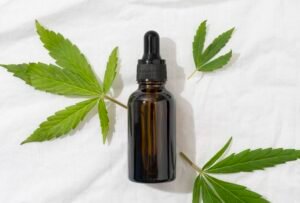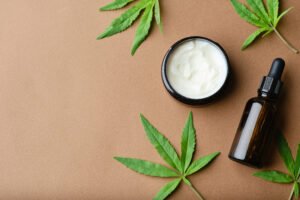Living with the persistent sounds of tinnitus can be a challenging and distressing experience, often leading to heightened anxiety. In response to this growing concern, many individuals have turned to CBD for tinnitus, or cannabidiol, as a potential remedy. CBD has been recognized for its anxiety-reducing properties, making it a subject of interest for those seeking relief from tinnitus-related anxiety. While existing evidence indicates that CBD holds promise in treating various anxiety disorders, more extensive research is essential to fully comprehend its effects and benefits.
Moreover, CBD for tinnitus has gained recognition for its ability to manage pain effectively. If your tinnitus is linked to ear inflammation or an injury, CBD’s anti-inflammatory properties may offer a viable option for alleviating discomfort. It’s important to consult with a healthcare professional to explore whether CBD for tinnitus can be a suitable part of your tinnitus management plan.
Intriguingly, our brain boasts cannabinoid receptors known as CB1 and CB2, which may play a crucial role in maintaining balance and hearing. These receptors can potentially interact with cannabinoids found in cannabis and CBD for tinnitus. This connection has sparked hope among some tinnitus sufferers that CBD for tinnitus could help in managing their condition. However, it’s essential to note that there is a shortage of comprehensive research in this specific area, necessitating further exploration.Furthermore, CBD for tinnitus’s potential to ease anxiety might allow individuals, under the guidance of a healthcare provider, to reduce their reliance on other medications for anxiety and pain management. This transition can offer a more holistic approach to tinnitus treatment, addressing both the physical discomfort and emotional distress that often accompanies this condition.
While the relationship between CBD for tinnitus and tinnitus management holds significant promise, it is crucial to acknowledge the need for more extensive research to fully comprehend its potential benefits. If you are considering incorporating CBD for tinnitus into your tinnitus management plan, consult with a healthcare professional who can provide personalized guidance and ensure the most appropriate treatment approach for your specific needs. CBD for tinnitus may prove to be a valuable addition to your journey towards relief and improved quality of life.
Understanding the Risks of CBD for Tinnitus
While the potential benefits of CBD for tinnitus management have garnered attention, it’s crucial to be aware of associated risks. It’s noteworthy that findings from an animal-related study suggest that cannabinoids, including CBD, might exacerbate tinnitus. This is particularly relevant for individuals whose tinnitus is a result of exposure to loud noise. The dorsal cochlear nucleus (DCN) in the ear plays a pivotal role in the perception of phantom sounds, especially in noise-induced tinnitus cases. There’s a hypothesis that CBD can influence specific receptors within the DCN, potentially increasing the activity of cells responsible for transmitting sound information between the inner ear and the brain. This heightened activity may lead to an escalation of tinnitus symptoms.
Furthermore, it’s important to recognize that the quality of CBD products is not currently regulated by the FDA. As of January 2023, the FDA has established an internal working group to explore potential regulatory frameworks for CBD products and assess associated risks. Janet Woodcock, MD, the FDA’s principal deputy commissioner, has emphasized that the use of CBD raises various safety concerns, particularly with prolonged use.
As of now, the FDA has granted approval for only one CBD product, Epidiolex. This prescription drug is intended to manage seizures associated with Lennox-Gastaut syndrome (LGS), Dravet syndrome (DS), or tuberous sclerosis complex (TSC) in individuals aged one year and older.
When considering CBD for tinnitus or any other condition, it’s crucial to be mindful of potential side effects, which may include:
1. Dry Mouth
2. Liver Injury
3. Interactions with Other Medications
4. Drowsiness or Sleepiness
5. Adverse Effects on Male Fertility
6. Digestive Problems such as Diarrhea or Decreased Appetite
7. Mood Changes like Crankiness or Agitation
These side effects underline the importance of consulting with a healthcare professional to evaluate the suitability of CBD for tinnitus management, assess potential risks, and determine the most appropriate course of action based on your individual needs and medical history. Safety and informed decision-making should always be the top priorities in exploring CBD as an option for tinnitus relief.
How to Use CBD for Tinnitus Relief
CBD is available in various forms, including oil, extracts, capsules, patches, vape products, gummies, and topical applications for the skin. When considering CBD for tinnitus management, it’s common to opt for CBD oil. Here’s how you can use it effectively:
CBD oil is frequently chosen for tinnitus relief. To use it, simply place a few drops of the oil under your tongue using a dropper. This method allows for rapid absorption of CBD into your bloodstream.
When contemplating the use of CBD to alleviate tinnitus symptoms, it’s vital to engage in a conversation with your healthcare professional. This step is essential to understand how CBD might interact with any medications you are currently taking. For instance, CBD oil may have interactions with blood-thinning medications. Therefore, it’s advisable to consult not only with your doctor but also with an audiologist, a specialist in treating hearing disorders. Their expertise can provide you with valuable insights into the potential benefits and risks of using CBD for tinnitus, ensuring a well-informed and safe approach to symptom management.
How to Treat CBD for Tinnitus Relief
Regrettably, tinnitus currently lacks a definitive cure, emphasizing the importance of treatment strategies. Determining the right treatment begins with a thorough examination to identify potential underlying causes of your tinnitus.
Various factors can contribute to tinnitus, including:
Hearing Loss: Hearing loss is a frequent trigger for tinnitus. Exposure to loud noises, cerumen (earwax) blockage, head or neck trauma, TMJ, sinus and allergy problems, high blood pressure, and even dietary factors can all play a role in tinnitus development.
Among the two forms of tinnitus, subjective tinnitus is the more prevalent type.
To devise the most effective treatment plan, a comprehensive assessment is essential. Hearing tests will be conducted to identify potential issues such as earwax blockage, hearing loss, or other auditory concerns.
In cases where tinnitus is linked to hearing loss (a common association), one prevalent treatment method is the use of hearing aids.
You might wonder why someone with tinnitus would consider hearing aids. The reason lies in the advanced technology used in these devices. Specifically, hearing aids designed to address tinnitus employ masking technology that introduces white noise, effectively countering the distracting tinnitus sounds. When combined with counseling techniques aimed at redirecting your focus away from tinnitus, this approach has proven highly effective.
While CBD for tinnitus is an area of interest, its efficacy requires further research and consideration. Therefore, your best choice for addressing tinnitus remains expert care and advanced technology, provided and tailored by a trusted team of professionals dedicated to your hearing health.
FAQs
Q. Is CBD a promising solution for tinnitus?
A. CBD shows potential for tinnitus management, particularly in reducing anxiety and pain. However, more research is needed to fully understand its effects on tinnitus.
Q. Can CBD worsen tinnitus symptoms?
A. Some animal studies suggest that CBD might exacerbate tinnitus, especially in cases caused by loud noise exposure. This highlights the need for caution and consultation with healthcare professionals.
Q. What are the potential risks of using CBD for tinnitus?
A. Risks associated with CBD for tinnitus include dry mouth, liver injury, interactions with other medications, drowsiness, fertility issues in males, digestive problems, and mood changes. It’s important to be aware of these potential side effects and consult with a healthcare professional.
Q. How can CBD be used for tinnitus relief?
A. CBD for tinnitus is commonly available in oil form. You can use it by placing a few drops under your tongue for rapid absorption into the bloodstream. However, consult with a healthcare professional to understand potential interactions with other medications.
Q. Is there a cure for tinnitus?
A. Currently, there is no definitive cure for tinnitus. Treatment approaches focus on managing symptoms, often through the use of advanced technology like hearing aids that incorporate masking technology to alleviate tinnitus sounds.
Q. What should I do if I want to explore CBD for tinnitus?
A. If you’re considering using CBD for tinnitus, consult with a healthcare professional, such as an audiologist, who specializes in hearing disorders. They can provide guidance on its suitability and potential risks based on your individual needs and medical history.
Q. What’s the best approach for tinnitus management?
A. While CBD for tinnitus is of interest, the most effective approach for tinnitus management involves expert care, advanced technology, and counseling techniques offered by trusted healthcare professionals dedicated to hearing health.








